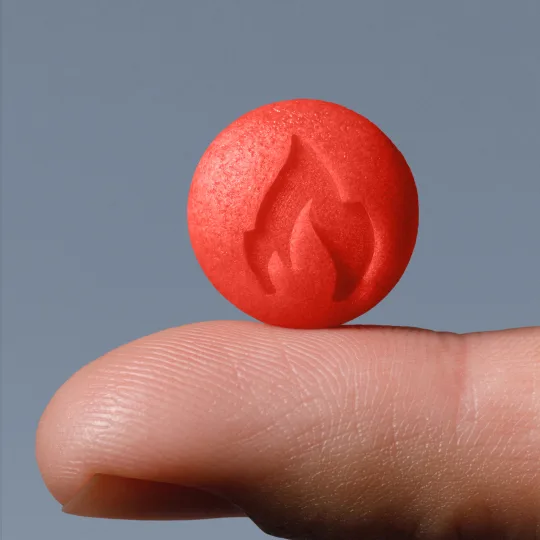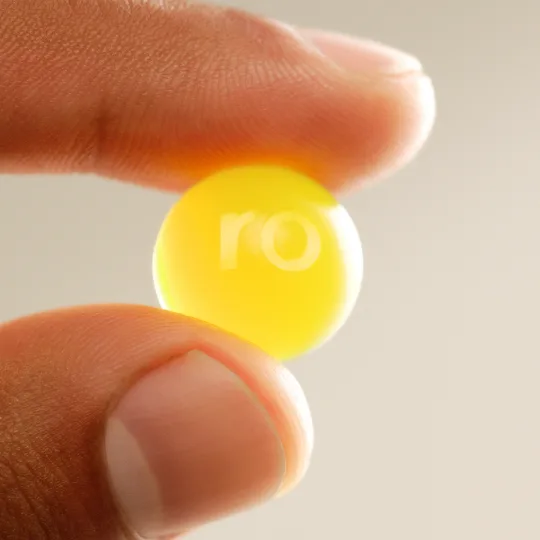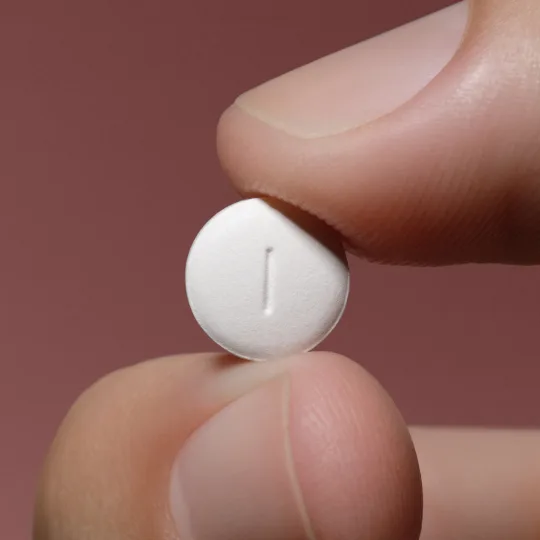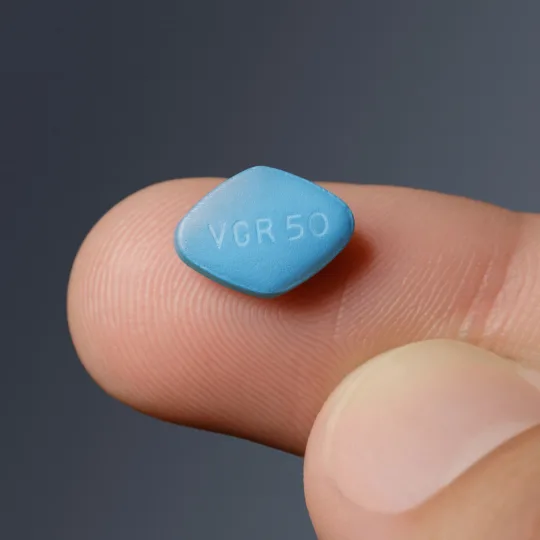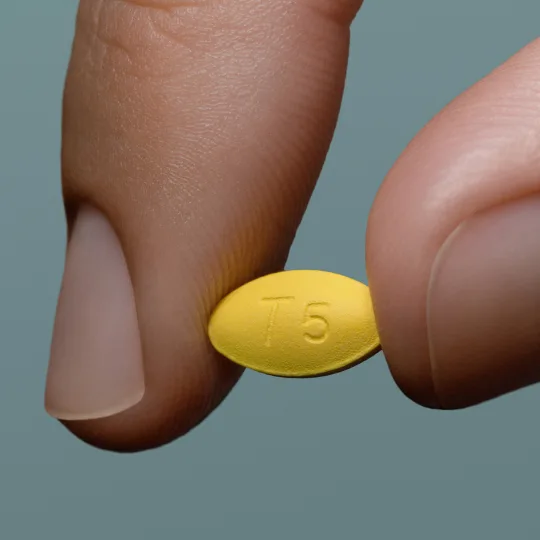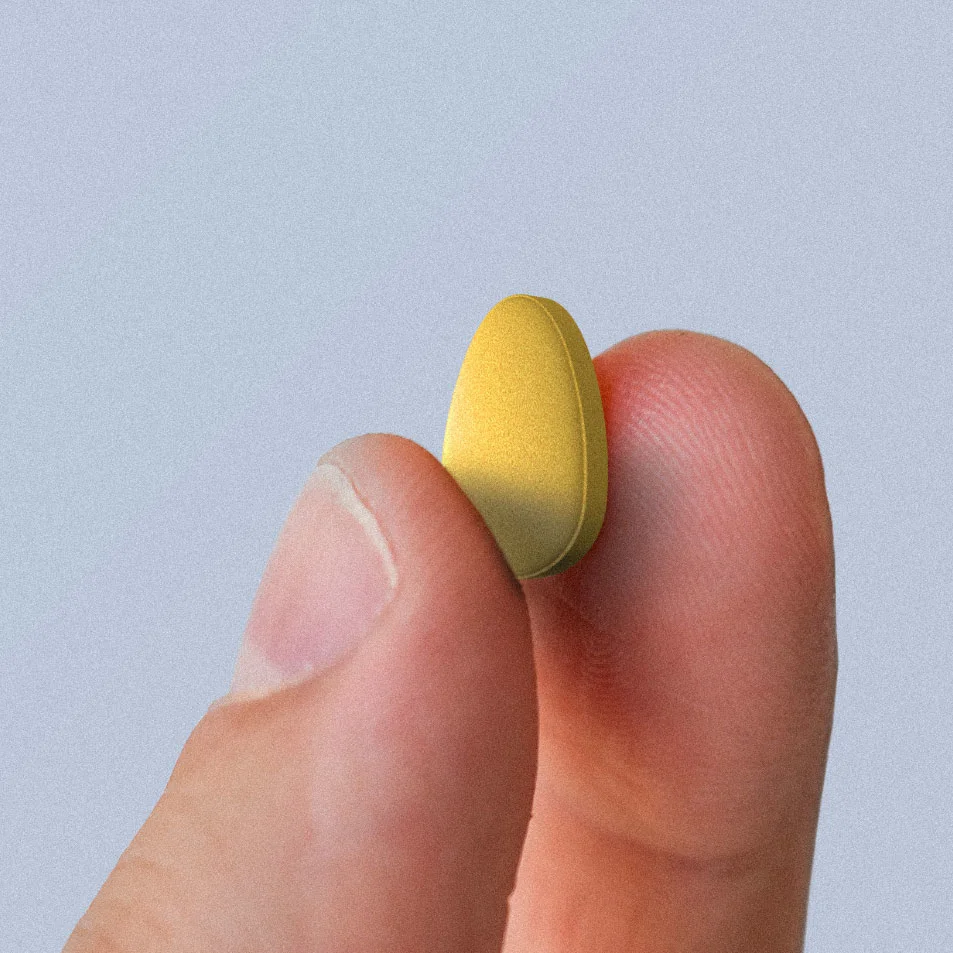Key takeaways
ED in your 20s is more common than most people realize, with studies showing that up to one in three men under 40 experience it.
Triggers can include stress, anxiety, poor sleep, lifestyle factors, medical conditions, or certain medications, all of which affect blood flow, hormones, or sexual response.
The encouraging news is that ED at a young age is usually reversible, and many men see improvement with lifestyle changes, treatment, or by addressing underlying health issues.
Here's what we'll cover
Here's what we'll cover
Here's what we'll cover
Key takeaways
ED in your 20s is more common than most people realize, with studies showing that up to one in three men under 40 experience it.
Triggers can include stress, anxiety, poor sleep, lifestyle factors, medical conditions, or certain medications, all of which affect blood flow, hormones, or sexual response.
The encouraging news is that ED at a young age is usually reversible, and many men see improvement with lifestyle changes, treatment, or by addressing underlying health issues.
You may ask, “Why do I have ED in my 20s?” if you’re diagnosed with erectile dysfunction (ED) younger than you may have expected.
Erectile dysfunction isn’t just something that happens later in life — it can affect young men too. point. While studies vary regarding the exact percentage of men under 40 experiencing ED, part of the problem is that those with ED may hesitate to seek out medical care leading to under-reporting. Some studies have found that as many as 35% of men under 40 report experiencing ED at some point. So whether you’ve run into sudden erectile dysfunction at 21 years old or have had occasional trouble in your late 20s, know that you’re not the only one.
Still, running into ED at a young age can be confusing and frustrating. You might wonder if something’s “wrong” with you or worry that the problem will persist throughout your life. The reality is that many cases of ED in the younger population have a clear cause, whether it’s mental health, lifestyle habits, or an underlying medical condition. If your ED has a clear-cut cause, the good news is that many of these issues can be improved or even reversed in close collaboration with your healthcare provider.
That’s why understanding the “why” behind ED is so important. Below, we’ll break down 12 of the most common causes of erectile dysfunction in your 20s, along with practical steps you can take to address them.
1. High blood pressure
High blood pressure (aka hypertension) can take a toll on sexual health. Research shows men with hypertension are more likely to report ED than those without vascular disease because long-term high blood pressure can damage blood vessels.
That’s because consistently high pressure in the arteries damages the lining of blood vessels, making them stiffer and less able to relax. When that happens, it becomes harder for enough blood to flow into the penis to trigger and maintain an erection. Over time, poorly managed blood pressure can also increase the risk of other cardiovascular problems, which only adds to the strain on erectile function.
Poorly controlled blood pressure is associated with a higher risk of ED. Erectile dysfunction may serve as an early indicator of underlying vascular conditions, including atherosclerosis and cardiovascular disease.
If you are experiencing ED, it is worth checking your blood pressure to see if it could possibly be a cause.
2. Medications (and drugs)
If you just started a medication, it could be behind the ED in your 20s.
Some prescription medications can interfere with erections because they affect blood flow, nerve signals, or hormone balance. Common culprits include:
Antidepressants
Blood pressure medications
Diuretics
Antihistamines
Anti-seizure drugs
Chemotherapy
Recreational substances can have similar effects. Marijuana, cocaine, and opioids can all interfere with blood vessels, hormone levels, and the brain’s reward system, making it harder to get or keep an erection.
If you notice ED beginning soon after starting a new medication — or after using a recreational substance — talk to your healthcare provider. Sometimes adjusting the dose or switching to another medication can help. If substance use may be contributing, your provider can also support you in reducing or stopping safely.
Never stop a prescription medication on your own. Your healthcare provider can help you transition safely if a change is needed and ensure you’re monitored appropriately throughout treatment.
3. Obesity
Obesity is a well-established risk factor for ED, even in younger men. Excess fat tissue (especially around your abdomen) can disrupt hormone balance, lower testosterone, and interfere with healthy blood flow. Obesity also increases the likelihood of developing conditions like diabetes, high blood pressure, and heart disease, all of which can further undermine erectile health over time.
The encouraging part is that ED linked to obesity isn’t set in stone. Building everyday habits that support weight loss, such as maintaining a balanced diet and engaging in regular physical activity, has been shown to improve erectile function.
4. Low testosterone
Testosterone is a hormone that plays a key role in male sexual health, influencing libido, energy, and erectile function. While testosterone typically declines with age, men of any age can experience low T due to medical conditions (like diabetes and anemia), obesity, injury, or chemotherapy.
Symptoms can include reduced sex drive, fatigue, mood changes, and weaker erections. Bloodwork can confirm whether testosterone is low, and treatment options may include lifestyle changes, managing underlying conditions, or hormone therapy under medical guidance.
5. Stress and anxiety
Stress is a normal part of life, but too much of it can get in the way of sexual performance.
When you’re stressed — whether it’s from school, work, money, or relationships — your body releases cortisol and adrenaline. These stress hormones trigger your “fight or flight” response, which raises blood pressure and creates vasculogenic resistance (stiffer, less flexible blood vessels). The result: reduced blood flow to the penis, making it harder to get or keep an erection.
Performance anxiety, specifically, is a specific type of stress that can be a frequent culprit behind ED in your 20s. Worrying about whether you’ll perform well in bed can lead to a cycle where the anxiety prevents you from getting or maintaining an erection. In fact, research shows that sexual performance anxiety affects up to 25% of men and is strongly linked to ED and premature ejaculation.
One telltale sign: If you notice your erections are fine when you’re alone but less reliable with a partner, stress or anxiety may be a factor.
6. Depression and other mental health conditions
Depression affects millions of young adults, and it can impact many different areas of your life. It can even lower your sex drive and make it harder to get or keep an erection. In fact, research suggests depression doesn’t just overlap with ED — it may actually raise the risk of developing it.
Medication adds another layer. Antidepressants, especially selective serotonin reuptake inhibitors (SSRIs), are known to cause sexual side effects like ED. This can make it hard to know whether it’s the depression itself, the treatment, or both.
If you’re struggling with mental health symptoms alongside ED, talking to a healthcare provider is key. They may adjust your medication, recommend therapy, or suggest other treatments to help both your mood and erections.
7. Sleep problems
Sleep disorders like sleep apnea can take a toll on sexual health. In obstructive sleep apnea (OSA), your breathing repeatedly stops and starts during sleep. That lowers oxygen levels and can prevent you from getting truly restful sleep.
Those drops in oxygen don’t just leave you tired — they also strain your blood vessels. Over time, this reduces nitric oxide (the chemical that relaxes blood vessels, allowing blood to flow into the penis) and increases endothelin (a compound that constricts vessels). This combination makes it harder to get and maintain erections.
OSA also throws off hormone balance (especially testosterone) and cranks up your “fight or flight” response, which makes it harder for blood to reach the penis. It’s no surprise, then, that men with sleep apnea are more likely to experience ED.
The upside? Treating OSA (most often with CPAP therapy) can improve sleep quality, restore energy, and even help restore erectile function.
8. Alcohol use
Alcohol slows the way your brain and body communicate, which is why too much can interfere with sexual arousal. A drink or two may take the edge off, but heavy alcohol use or binge drinking can make it tough to get or keep an erection — hence the term “whiskey dick.” It’s a common, usually temporary effect, but if it happens often, it can start to take a toll on confidence and sexual satisfaction.
Over the long term, heavy drinking is hard on the body. It can change circulation, affect your blood vessels, and even lower testosterone levels over time. All of these factors make erectile problems more likely. If ED mostly shows up after drinking, alcohol is probably the culprit, and the good news is that cutting back is often enough to get things back on track.
9. Smoking and vaping
Nicotine squeezes your blood vessels, which makes it harder for blood to reach the penis. That’s why smoking is one of the most significant lifestyle-related risk factors for ED. And it’s not just pack-a-day smokers — even casual smoking or vaping can chip away at erection quality.
Research backs this up: One review found that both past and current smoking raise ED risk, and the effect is dose-dependent (meaning the more you smoke, the greater the impact). The connection holds true even for younger men, which means smoking can raise ED risk well before middle age.
Fortunately, your body can bounce back faster than you might think. Quitting smoking or vaping has been shown to improve erectile function, sometimes within just a few weeks. And the longer you stay smoke-free, the better the recovery.
10. Porn overuse
Porn itself isn’t harmful for most people when used in moderation, but problems can crop up when you use it excessively. In fact, research suggests that men who score higher on measures of problematic porn use are more likely to report ED, even after accounting for things like alcohol use or how often they masturbate.
One theory for why this might be is that repeated exposure to high-intensity or novel porn can desensitize the brain’s reward system. In practice, that means real-life sex may not feel as stimulating compared to what your brain has gotten used to online. That’s why some people use the term “porn-induced ED,” even though it’s not an official diagnosis.
If you find it’s easier to get an erection when watching porn than during sex with a partner, cutting back could help. One study found that some men notice improvements after limiting their porn use. Of course, results vary from person to person — but if you suspect porn may be part of the problem, taking a break and seeing how your body responds is often a good first step.
11. Poor diet and lack of exercise
Studies suggest that diets like the Mediterranean diet, which include plenty of fruits, veggies, whole grains, nuts, legumes, and healthy fats, have been linked with better erectile function and a lower risk of ED. On the flip side, diets high in red meat, processed food, and sugary drinks can increase your risk for erectile problems.
Lack of physical activity can also make things worse. Exercise can improve circulation, boost testosterone, and support cardiovascular health. That’s why men who are physically active are less likely to develop ED compared to those who are more sedentary.
12. Diabetes
Diabetes can disrupt your vascular system, potentially damaging the blood vessels and nerves that make erections possible. That’s why ED is one of the most common complications of diabetes — in fact, one study found that nearly 60% of men with type 2 diabetes also had ED. For some young men, ED can even be a warning sign of prediabetes or asymptomatic diabetes, which is one of the reasons it’s so important to see a healthcare provider if you are experiencing ED.
If you have diabetes, managing your blood sugar can go a long way toward preventing ED. And if you haven’t been diagnosed with diabetes but notice sudden ED in your early 20s along with symptoms like frequent urination or constant thirst, it’s worth getting tested.
How to treat erectile dysfunction in your 20s
Ultimately, the best treatment for you depends on why you’re dealing with ED in the first place. But the good news is that in many cases, if you have ED in your 20s, it could be reversible. Here are some proven strategies to help:
Make lifestyle changes
Think of this as strengthening your foundation. Better sleep, regular exercise, cutting back on alcohol, and quitting smoking all support healthy blood flow, which is the engine behind strong erections.
And the benefits don’t stop at the bedroom. These changes can also boost your energy, mood, and long-term health, making them some of the most effective first steps you can take.
Address mental health
Psychological factors are a common cause of ED in your 20s. Performance worries can create a vicious cycle: Stress makes it more difficult to get hard, which only leads to more stress the next time. Depression can also drain your sex drive, and some antidepressants may make erections more difficult.
Stress-management strategies like therapy and mindfulness meditation can break the cycle of performance anxiety. And if medication side effects are part of it, your provider may be able to adjust your treatment so your mood and your sex life improve.
Consider medication
Oral ED medications like sildenafil (Viagra) or tadalafil (Cialis) are game-changers for a lot of men. They work in part by boosting blood flow to the penis so it’s easier to get and keep an erection. Some work fast and wear off in a few hours, while others can be taken daily so you don’t have to plan your sex life around doses of medication.
These meds are safe and effective for most men, but they’re not a one-size-fits-all fix. The best treatment for your ED depends on your health, your lifestyle, and your goals for treatment. That’s where your healthcare provider comes in — they can walk you through options and help you find the one that fits best.
Optimize hormone health
Low testosterone isn’t just a reason men of an older age stop getting hard — it can show up in your 20s too. Symptoms like low sex drive, fatigue, mood changes, or weaker erections can be a sign that your levels are off. The only way to know for sure is through bloodwork, which your provider can order.
If you are diagnosed with low testosterone levels, treatment may involve lifestyle changes (like losing weight, exercising, or improving sleep) or even hormone therapy if appropriate. The right plan can restore balance and support both your sexual health and overall well-being. Remember, it’s never a good idea to start testosterone treatment on your own. Taking it without medical supervision can throw off your body’s natural hormone balance, raise your risk for heart problems, and even lower fertility over time.
Treat underlying conditions
Sometimes ED is more than just a standalone issue — it can be a red flag for a bigger health issue, like diabetes, high blood pressure, or sleep apnea. These conditions affect blood flow, hormone balance, and nerve health, all of which play a direct role in sexual function. That’s why paying attention to changes in your erections can actually give you an early heads-up about what’s happening in the rest of your body.
The best way to get clarity is to work with your healthcare provider. They can run any necessary tests, talk through your symptoms, and help pinpoint what’s really going on. From there, they’ll suggest treatment options tailored to you, whether that’s lifestyle changes, medication, or a combination of both.
Have better sex with Ro
Bottom line
ED in your 20s can feel confusing and discouraging, but it’s rarely something you’re stuck with forever. Most of the time, there’s a clear reason behind it. And once you address the cause, symptoms often improve. Here’s what to keep in mind:
The causes vary, but many contributing factors are reversible. Stress, depression, sleep problems, alcohol, smoking, porn overuse, poor diet, obesity, diabetes, high blood pressure, low testosterone, and certain medications can all play a role.
Lifestyle changes can make a big impact. Better sleep, regular exercise, a balanced diet, cutting back on alcohol, and quitting smoking all support stronger erections (and improve your overall health, too).
Mental health matters. Anxiety and depression can both contribute to ED, especially in younger men. Addressing these with therapy, mindfulness, or medication adjustments can often help break the cycle. It can also be helpful to speak openly with your sexual partner(s).
There are safe and effective treatments available. ED medications, hormone support if you have a hormone deficiency, or treatment for underlying conditions (like diabetes or sleep apnea) can sometimes restore erectile function. Your provider can help you choose the best option for your individual needs.
Frequently asked questions (FAQs)
Is ED in your 20s normal?
While erectile dysfunction isn’t “normal” per se, it is certainly not uncommon. Though it may feel surprising to learn, many men experience erectile dysfunction in their 20s. It’s often temporary and linked to things like stress, lifestyle habits, or mental health — factors that can be treatable. While individual experiences may vary, speaking with your healthcare provider about your symptoms is a good start.
How common is ED in your 20s?
While reported percentages vary because some men experiencing ED may hesitate to seek medical care, research suggests that up to 35% of men under 40 report some degree of ED. However, this doesn’t mean the condition is permanent: ED at this age could be reversible if you address the underlying cause.
DISCLAIMER
If you have any medical questions or concerns, please talk to your healthcare provider. The articles on Health Guide are underpinned by peer-reviewed research and information drawn from medical societies and governmental agencies. However, they are not a substitute for professional medical advice, diagnosis, or treatment.
Viagra Important Safety Information: Read more about serious warnings and safety info.
Cialis Important Safety Information: Read more about serious warnings and safety info.
References
Allen, M. & Tostes, R. (2023). Cigarette smoking and erectile dysfunction: an updated review with a focus on pathophysiology, e-cigarettes, and smoking cessation, Sexual Medicine Reviews, 11(1), 61–73. https://doi.org/10.1093/sxmrev/qeac007. Retrieved from https://academic.oup.com/smr/article/11/1/61/6985842
Becker, S., Suija, K., Valpas, A., et al. (2024). Erectile dysfunction as a predictive indicator of asymptomatic diabetes and prediabetes. Primary Care Diabetes, 18(6), 618–623. https://doi.org/10.1016/j.pcd.2024.09.008. Retrieved from https://pubmed.ncbi.nlm.nih.gov/39393949/
Chand, S. P. & Arif, H. (2023). Depression. StatPearls. Retrieved from https://www.ncbi.nlm.nih.gov/books/NBK430847/
Chen, W. K., Zhou, T., Yu, D. D., et al. (2023). Effects of major depression and bipolar disorder on erectile dysfunction: a two-sample mendelian randomization study. BMC Medical Genomics, 16(1), 66. https://doi.org/10.1186/s12920-023-01498-8. Retrieved from https://bmcmedgenomics.biomedcentral.com/articles/10.1186/s12920-023-01498-8
Cho, J. W. & Duffy, J. F. (2019). Sleep, Sleep Disorders, and Sexual Dysfunction. The World Journal of Men's Health, 37(3), 261–275. https://doi.org/10.5534/wjmh.180045. Retrieved from https://wjmh.org/DOIx.php?id=10.5534/wjmh.180045
Chu, B., Marwaha, K., & Sanvictores, T., et al. (2024). Physiology, Stress Reaction. StatPearls. Retrieved from https://www.ncbi.nlm.nih.gov/books/NBK541120/
Gu, Y., Wu, C., Qin, F., & Yuan, J. (2022). Erectile Dysfunction and Obstructive Sleep Apnea: A Review. Frontiers in Psychiatry, 13, 766639. https://doi.org/10.3389/fpsyt.2022.766639. Retrieved from https://pmc.ncbi.nlm.nih.gov/articles/PMC9178074/
Halpern, J. & Brannigan, R. (2019). Testosterone Deficiency. JAMA, 322(11). doi: 10.1001/jama.2019.9290. Retrieved from https://jamanetwork.com/journals/jama/fullarticle/2749876
Hernández-Cerda, J., Bertomeu-González, V., Zuazola, P., & Cordero, A. (2020). Understanding Erectile Dysfunction in Hypertensive Patients: The Need for Good Patient Management. Vascular Health and Risk Management, 16, 231–239. https://doi.org/10.2147/VHRM.S223331. Retrieved from https://pmc.ncbi.nlm.nih.gov/articles/PMC7297457/
Huangfu, Z., Gan, X., Yang, Y., et al. (2024). A Mendelian randomization study on causal effects of leisure sedentary behavior on the risk of erectile dysfunction. Andrology, 12(8), 1841–1850. https://doi.org/10.1111/andr.13611. Retrieved from https://onlinelibrary.wiley.com/doi/10.1111/andr.13611
Jacobs, T., Geysemans, B., Van Hal, G., et al. (2021). Associations Between Online Pornography Consumption and Sexual Dysfunction in Young Men: Multivariate Analysis Based on an International Web-Based Survey. JMIR Public Health and Surveillance, 7(10), e32542. https://doi.org/10.2196/32542. Retrieved from https://pmc.ncbi.nlm.nih.gov/articles/PMC8569536/
Karunakaran, A. & Michael, J. P. (2022). The Impact of Abstinence From Alcohol on Erectile Dysfunction: A Prospective Follow up in Patients With Alcohol Use Disorder. Journal of Sexual Medicine, 2022, 19(4), 581-589. doi: 10.1016/j.jsxm.2022.01.517. Retrieved from https://www.sciencedirect.com/science/article/abs/pii/S1743609522005513
Leslie, S. W. & Sooriyamoorthy, T. (2024). Erectile Dysfunction. StatPearls. Retrieved from https://www.ncbi.nlm.nih.gov/books/NBK562253/
Moon, K. H., Park, S. Y., & Kim, Y. W. (2019). Obesity and Erectile Dysfunction: From Bench to Clinical Implication. The World Journal of Men's Health, 37(2), 138–147. doi: 10.5534/wjmh.180026. Retrieved from https://pmc.ncbi.nlm.nih.gov/articles/PMC6479091/
Nassar, G. N. & Leslie, S. W. (2023). Physiology, Testosterone. StatPearls. Retrieved from https://www.ncbi.nlm.nih.gov/books/NBK526128
National Library of Medicine. (2025). Drugs that may cause erection problems. Retrieved from https://medlineplus.gov/ency/article/004024.htm
Park, B. Y., Wilson, G., Berger, J., et al. (2016). Is Internet Pornography Causing Sexual Dysfunctions? A Review with Clinical Reports. Behavioral Sciences (Basel, Switzerland), 6(3), 17. doi: 10.3390/bs6030017. Retrieved from https://pmc.ncbi.nlm.nih.gov/articles/PMC5039517/
Parmar, R. S., Verma, S., Neelkamal, et al. (2022). Prevalence of erectile dysfunction in Type 2 diabetes mellitus (T2DM) and its predictors among diabetic men. Journal of Family Medicine and Primary Care, 11(7), 3875–3879. doi: 10.4103/jfmpc.jfmpc_1130_21. Retrieved from https://pmc.ncbi.nlm.nih.gov/articles/PMC9648286/
Patel, P. N., Horenstein, M. S. & Zwibel, H. (2024). Exercise Physiology. StatPearls. Retrieved from https://www.ncbi.nlm.nih.gov/books/NBK482280/
Piano, M. R. (2017). Alcohol's Effects on the Cardiovascular System. Alcohol Research : Current Reviews, 38(2), 219–241. Retrieved from https://pmc.ncbi.nlm.nih.gov/articles/PMC5513687/
Privara, M. & Bob, P. (2023). Pornography Consumption and Cognitive-Affective Distress. The Journal of Nervous and Mental Disease, 211(8), 641–646. doi: 10.1097/NMD.0000000000001669. Retrieved from https://pmc.ncbi.nlm.nih.gov/articles/PMC10399954/
Pyke, R. E. (2020). Sexual Performance Anxiety. Sexual Medicine Reviews, 8(2), 183–190. doi: 10.1016/j.sxmr.2019.07.001. Retrieved from https://pubmed.ncbi.nlm.nih.gov/31447414/
Safa, A. & Waked, C. (2025). Erectile Dysfunction in Young Adults: A Narrative Review. Cureus, 17(8), e89918. doi: 10.7759/cureus.89918. Retrieved from https://pmc.ncbi.nlm.nih.gov/articles/PMC12349891/
Sapra, A. & Bhandari, P. (2023). Diabetes. StatPearls. Retrieved from https://www.ncbi.nlm.nih.gov/books/NBK551501/
Slowik, J. M., Sankari, A., & Collen, J. F. (2025). Obstructive Sleep Apnea. StatPearls. Retrieved from https://www.ncbi.nlm.nih.gov/books/NBK459252/
Yang, B., Wei, C., Zhang, Y. C., et al. (2025). Association between improved erectile function and dietary patterns: a systematic review and meta-analysis. Asian Journal of Andrology, 27(2), 239–244. doi: 10.4103/aja202485. Retrieved from https://pmc.ncbi.nlm.nih.gov/articles/PMC11949448/
Yannas, D., Frizza, F., Vignozzi, L., et al. (2021). Erectile Dysfunction Is a Hallmark of Cardiovascular Disease: Unavoidable Matter of Fact or Opportunity to Improve Men's Health?. Journal of Clinical Medicine, 10(10), 2221. doi: 10.3390/jcm10102221. Retrieved from https://pmc.ncbi.nlm.nih.gov/articles/PMC8161068/



